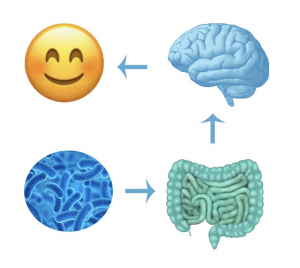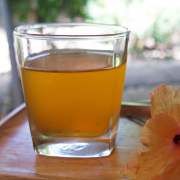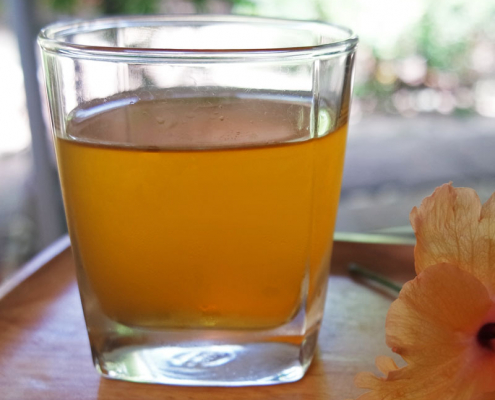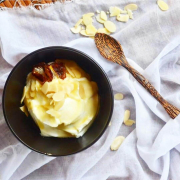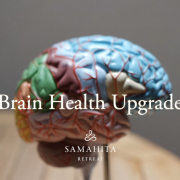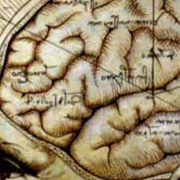 https://samahitaretreat.com/wp-content/uploads/2023/11/IMG_1290-2-scaled.jpg
1920
2560
Kirsten Mia
http://samahitaretreat.com/wp-content/uploads/2024/01/samahita-logo-v2.svg
Kirsten Mia2023-11-21 21:09:402023-11-21 21:09:40Music makes the world go round!
https://samahitaretreat.com/wp-content/uploads/2023/11/IMG_1290-2-scaled.jpg
1920
2560
Kirsten Mia
http://samahitaretreat.com/wp-content/uploads/2024/01/samahita-logo-v2.svg
Kirsten Mia2023-11-21 21:09:402023-11-21 21:09:40Music makes the world go round!Psychobiotics – From Gut to Brain
Is it possible that bacteria in your gut are affecting your mood, mental wellbeing and health of your brain and nervous system?
Introduction
The benefits of probiotics are well known within the health and wellness community and the health-aware public alike. As well as simply helping digestion these friendly microbes within our gut microbiome impact our immune system in positive ways such as competing with harmful bacteria and producing antimicrobial compounds. Taking antibiotics compromises the gut microbiota which is why you may have suffered diarrhea while treating an unrelated infection.
But it is not just our gut that is positively effected by probiotics. Ongoing research continues to support the positive role of gut microbes on mental health, in particular depression and anxiety, and brain related illness such as Alzheimer’s Disease through the gut-brain-axis. (1)
The Gut Brain Axis
The gut-brain-axis refers to a channel of communication between gut and brain. The gut microbiome communicate with the brain through the following methods: Production of neurotransmitters such as serotonin, dopamine and gamma-aminobutyric acid; Innervation of the vagus nerve (a cranial nerve directly connected to abdominal and thoracic organs and modulates the parasympathetic response); and involvement in the HPA (Hypothalamus-Pituitary-Adrenal) axis. (2) The HPA axis is a neuroendocrinal mechanism involved in the body’s stress response.
Psychobiotics
Introducing Psychobiotics. Is it possible that bacteria in your gut are affecting your mood, mental wellbeing and health of your brain and nervous system? Psychobiotics are a class of probiotics that, when eaten, induce mental health benefits through the gut-brain-axis via a series of processes such as enhancing neurotransmitter production in the gut (3), innervation of the vagus nerve and restoring proper gut barrier function to prevent the circulation of pro-inflammatory cytokines. (4).
So how does this work in practice? Many studies demonstrate the importance of microbiota diversity and the impact certain microbes have on depression and anxiety. One particular study discovered that taking the probiotic Lactobacillus (commonly found in Kimchi, water kefir & yoghurt) during and after pregnancy contributed to lower levels of post natal depression. (5) In another study college students given probiotic supplements for 28 days reported lower levels of depression and anxiety and better quality of life compared to those who took placebos. (6) It is also clear in experiments with rats that probiotics improve response to stress tests and induce effects comparable to antidepressants. (4)
Gut Microbiota Diversity
The diversity and composition of our gut microbiota can be improved through dietary changes alone. For example, eating natural probiotic fermented foods such as kimchi, miso soup and water kefir will increase gut microbiota diversity. And eating a wide range of fibrous foods such as fruit, vegetables and grains will ensure better supply of prebiotics. See our recipe and explanation of prebiotic rice.
Butyrates, Gamma-Aminobutyric Acid (GABA) and Prebiotics
Considering the proven benefits of probiotics from these and many more studies the question remains which specific microbes or probiotics may be used as a treatment for mental health conditions? The gut contains millions of bacteria and hundreds of varying strains many of which can not be cultured outside of the body thus proving difficult to isolate and test. Some common probiotics include Bifidobacteria and Lactobacilli, which are widely available as supplements but also easily obtainable through fermented foods, have proven successful in the trials mentioned above but it is believed that prebiotics may have the greater effect. Prebiotics (non-digestible carbohydrates such as galacto-oligosaccharides GOS and fructo-oligosaccharides FOS) act as a source of nutrition for Bifidobacteria and Lactobacilli. FOS and GOS are metabolized and fermented by these microbes within the gastrointestinal tract thus increasing production of Butyrates (a short chain fatty acid, SCFA) and the neurotransmitter gamma-aminobutyric acid (GABA)(7) among others.
Butyrates have a variety of functions in the human body and, specifically for this discussion, they bolster the brain’s natural defenses by preventing breakdown of the blood-brain-barrier(BBB) and promote neurogenesis (production of neurones). This prevents the passage of pathogens and inflammatory molecules into the brain. (14) This supports the theory of probiotics preventing neurodegenerative diseases such as Alzheimer’s(1)
It is not fully understood how gut originated neurotransmitters are able to cross the blood-brain barrier and therefore their direct effect on the brain are inconclusive. Also, reduced levels of GABA in the gut does not necessarily translate as lower levels in the brain. However, the mood altering effects are evidenced through modulation of the HPA axis and through communication with the brain via the vagus nerve.(2) Other studies to support the effect of GABA on mental health have shown that people suffering from depression display altered diversity and composition of gut microbiota (9) with lower levels of GABA compared to people who are not suffering. (8) (10). Which is why GABA producing probiotics are seen as potential treatments for some mental health disorders.
And so, if you’re not already convinced, we have even more reason to introduce fermented foods, yoghurts and prebiotic rice (see recipe) to our plates and even better that the ongoing research points towards a healthy non-pharmacological approach to solving common mental illnesses such as depression and anxiety.
Footnotes
(1) https://www.ncbi.nlm.nih.gov/pmc/articles/PMC4956742/
Antibiotic-induced perturbations in gut microbial diversity influences neuro-inflammation and amyloidosis in a murine model of Alzheimer’s disease
(2) https://www.ncbi.nlm.nih.gov/pmc/articles/PMC6005194/
Neurotransmitter modulation by the gut microbiota
(3) https://www.tandfonline.com/doi/abs/10.1080/10408398.2018.1542587Nondigestible carbohydrates, butyrate, and butyrate-producing bacteria (prebiotics and production of butyrate)
(4) https://www.ncbi.nlm.nih.gov/pmc/articles/PMC5102282/
Psychobiotics and the Manipulation of Bacteria–Gut–Brain Signals
(5) https://www.ebiomedicine.com/article/S2352-3964(17)30366-3/fulltext
Effect of Lactobacillus rhamnosus HN001 in Pregnancy on Postpartum Symptoms of Depression and Anxiety: A Randomised Double-blind Placebo-controlled Trial
(6) https://www.sciencedirect.com/science/article/abs/pii/S016503271831944X?via%3Dihub
The gut-brain relationship: Investigating the effect of multispecies probiotics on anxiety in a randomized placebo-controlled trial of healthy young adults.
(7) https://www.tandfonline.com/doi/full/10.1080/19490976.2017.1290756?src=recsys
Dietary fiber and prebiotics and the gastrointestinal microbiota
(8) https://lirias.kuleuven.be/2807515?limo=0
Assessment of the neuroactive potential of the gut microbiota in quality of life and depression
(9) https://www.ncbi.nlm.nih.gov/pmc/articles/PMC6456569/
Antidepressants affect gut microbiota and Ruminococcus flavefaciens is able to abolish their effects on depressive-like behavior
(10) https://www.nature.com/articles/s41564-018-0307-3
GABA-modulating bacteria of the human gut microbiota
Healthy gut, happy mind: What to eat to boost how you feel (paywall)
How what you eat directly influences your mental health (paywall)
(13) https://www.biologicalpsychiatryjournal.com/article/S0006-3223(13)00408-3/abstract
Psychobiotics: A Novel Class of Psychotropic
(14) https://www.tandfonline.com/doi/full/10.1080/19490976.2019.1638722
Gut microbes and metabolites as modulators of blood-brain barrier integrity and brain health
More from the Samahita Blog
